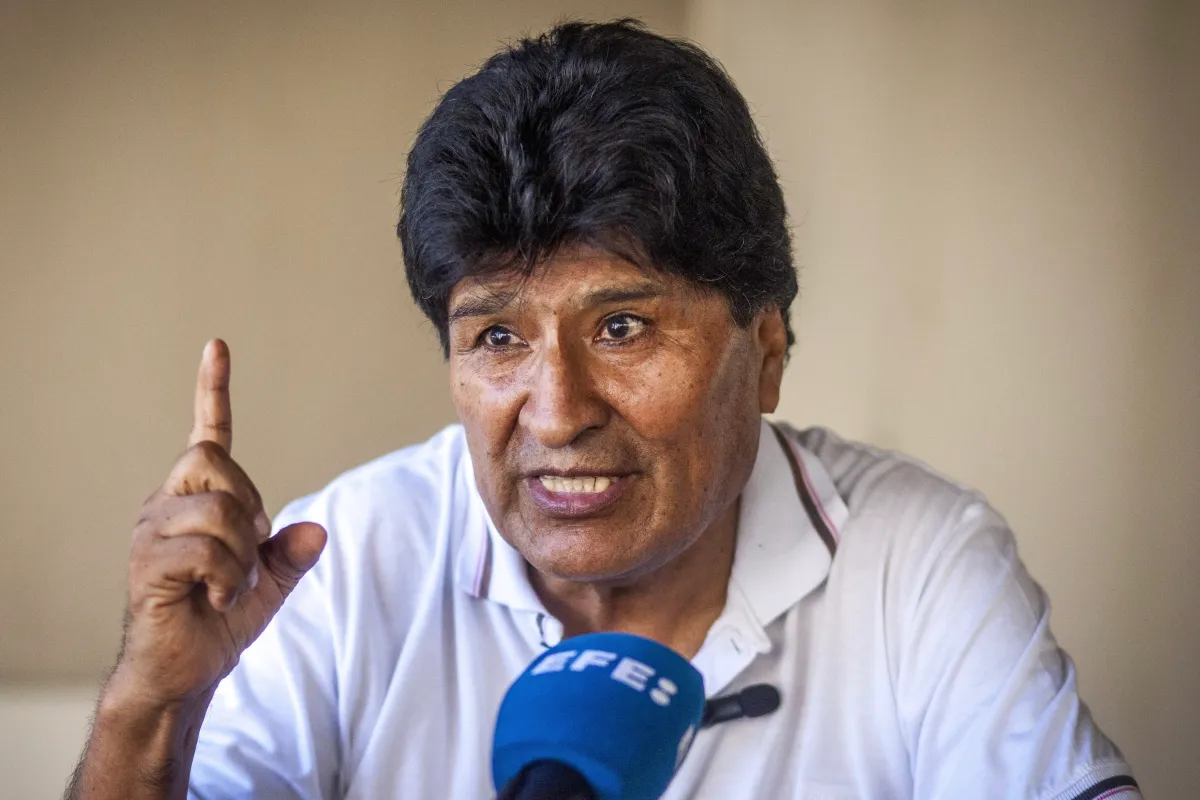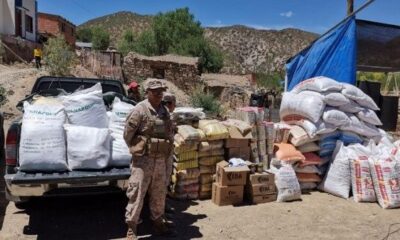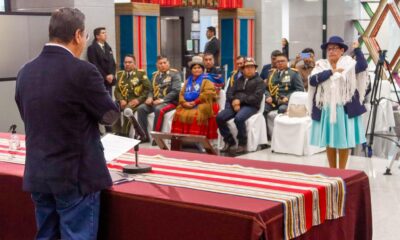International
Morales affirms that there will be “a seizure” in Bolivia if he is disqualified in the 2025 elections

The former president of Bolivia Evo Morales (2006-2019) said in an interview with EFE that there will be a “convulsion” in the country if his presidential candidacy for the 2025 elections is disqualified and blamed the Government of Luis Arce, with whom he has a fight despite belonging to the same party.
“If Evo is disabled, there will be a seizure. If you want that, well, that will be the responsibility of the Government (…) that’s my calculation, I’m sincere,” warned the also leader of the ruling Movement for Socialism (MAS).
Morales considered that “this kind of struggle is only won with mass action,” and said that he heard that various sectors anticipate “difficulties” in case his presidential candidacy is annulled.
At the end of last year, the Constitutional Court issued a ruling in which it mentions that indefinite re-election “is not a human right” and that it is only applied for once in a continuous or discontinuous way.
According to Morales, this must be understood as “an insinuation of a possible disqualification of his candidacy.”
The three-time president of Bolivia insisted that he is “legally and constitutionally authorized” to be a candidate, according to the consultations he himself made to “national and international experts.”
The ruling Movement for Socialism turns 29 years old and it is the first time that there are two separate celebrations.
In the city of La Paz, headquarters of the Government and the Legislative, the ‘arcist’ block celebrates, which supports President Luis Arce, while this Saturday will be the turn of the ‘evista’ wing, related to Evo Morales, in the town of Yapacaní, in the department of Santa Cruz.
Last year Morales and Arce coincided on the anniversary of the party in the Tropic of Cochabamba, the political bastion of the former president, in which there was friction among the militants of the MAS.
In that event, Evo Morales questioned the management of the one who was his Minister of Economy during his government, while Arce urged the MAS not to be afraid of the “pluralism” of ideas.
Morales pointed out that Arce “made a big mistake” by pointing out that “we should not be afraid of the pluralism of ideas” since, in his opinion, that marks an “ideological difference” with the ‘arcist’ sector, since the MAS is traditionally “anti-imperialist.”
The former president also questioned that the Arce Administration has not fulfilled two of the main mandates he received when he arrived at the Government in 2020, such as “prosecusing and imprisoning the coup plotters and genocide” for the 2019 crisis and “recovering the country’s economy”.
Morales resigned from the Presidency in 2019 after considering that he was the victim of a “coup d’état” after the frustrated elections of that year, between complaints from the opposition of an electoral fraud in his favor for a fourth consecutive term.
On November 12, 2019, Jeanine Áñez assumed the interim command of the country as the second vice president of the Senate, two days after the resignation of Evo Morales and all the officials in the presidential succession line.
“I thought that if (I) would return (to be president of Bolivia) it would be to do justice (…) because I have been given a (state) coup,” he said.
To the division for the anniversary of the MAS is added the struggle for the legality of the MAS congress, which was held last year in the Cochabamba region, and in which Morales was proclaimed as the “single candidate” for the 2025 presidential elections.
The ruling sectors related to Arce called for another congress, which will be held in May, after the electoral authority determined that a new meeting should be held.
Morales insisted that the congress that re-elected him as the top leader of the MAS met all the requirements and that the electoral body acted with “illegality,” while the call of the “arcists” is made by those who “are not militants” in that party.
The former president ratified that the MAS “is united at the level of the bases” and that a few leaders decided to demarcate themselves in exchange for alleged “bribes” offered to them by the Government.
International
U.S. Senate Rejects Budget, Bringing Government Closer to Shutdown Amid DHS Dispute

The U.S. Senate voted on Thursday against a budget proposal in a move aimed at pressuring changes at the Department of Homeland Security (DHS), following the killing of two civilians during a deployment of immigration agents in Minneapolis.
All Senate Democrats and seven Republican lawmakers voted against the bill, which requires 60 votes to advance, pushing the country closer to a partial government shutdown that would cut funding for several agencies, including the Pentagon and the Department of Health.
The rejection came as Senate leaders and the White House continue negotiations on a separate funding package for DHS that would allow reforms to the agency. Proposed measures include banning Immigration and Customs Enforcement (ICE) agents from wearing face coverings and requiring them to use body-worn cameras during operations.
The vote took place just hours after President Donald Trump said he was “close” to reaching an agreement with Democrats and did not believe the federal government would face another shutdown, following last year’s record stoppage.
“I don’t think the Democrats want a shutdown either, so we’ll work in a bipartisan way to avoid it. Hopefully, there will be no government shutdown. We’re working on that right now,” Trump said during a Cabinet meeting at the White House.
International
Trump Says Putin Agreed to One-Week Halt in Attacks on Ukraine Amid Extreme Cold

U.S. President Donald Trump said on Thursday that he secured a commitment from Russian President Vladimir Putinto halt attacks against Ukraine for one week, citing extreme weather conditions affecting the region.
“Because of the extreme cold (…) I personally asked Putin not to attack Kyiv or other cities and towns for a week. And he agreed. He was very pleasant,” Trump said during a Cabinet meeting broadcast by the White House.
Trump acknowledged that several advisers had questioned the decision to make the call.
“A lot of people told me not to waste the call because they wouldn’t agree. And he accepted. And we’re very happy they did, because they don’t need missiles hitting their towns and cities,” the president said.
According to Trump, Ukrainian authorities reacted with surprise to the announcement but welcomed the possibility of a temporary ceasefire.
“It’s extraordinarily cold, record cold (…) They say they’ve never experienced cold like this,” he added.
Ukrainian President Volodymyr Zelensky later commented on the announcement, expressing hope that the agreement would be honored.
International
Storm Kristin Kills Five in Portugal, Leaves Nearly 500,000 Without Power

Storm Kristin, which battered Portugal with heavy rain and strong winds early Wednesday, has left at least five people dead, while nearly half a million residents remained without electricity as of Thursday, according to updated figures from authorities.
The revised death toll was confirmed to AFP by a spokesperson for the National Emergency and Civil Protection Authority (ANPEC). On Wednesday, the agency had reported four fatalities.
Meanwhile, E-Redes, the country’s electricity distribution network operator, said that around 450,000 customers were still without power, particularly in central Portugal.
Emergency services responded to approximately 1,500 incidents between midnight and 8:00 a.m. local time on Wednesday, as the storm caused widespread disruptions.
The Portuguese government described Kristin as an “extreme weather event” that inflicted significant damage across several regions of the country. At the height of the storm, as many as 850,000 households and institutions lost electricity during the early hours of Wednesday.
Several municipalities ordered the closure of schools, many of which remained shut on Thursday due to ongoing adverse conditions.
Ricardo Costa, regional deputy commander of the Leiria Fire Brigade, said residents continue to seek assistance as rainfall persists.
“Even though the rain is not extremely intense, it is causing extensive damage to homes,” he noted.
In Figueira da Foz, a coastal city in central Portugal, strong winds toppled a giant Ferris wheel, underscoring the severity of the storm.
-

 Central America4 days ago
Central America4 days agoGuatemala seizes over a ton of cocaine hidden in flour at Pacific port
-

 International5 days ago
International5 days agoDelcy Rodríguez seeks political agreements after Maduro’s ouster
-

 International4 days ago
International4 days agoHistoric snowstorm paralyzes Toronto after 60 centimeters of snow
-

 Central America3 days ago
Central America3 days agoGuatemala Police Arrest Prison Guard Caught in the Act of Extortion
-

 Central America3 days ago
Central America3 days agoHonduras swears in conservative president Asfura after disputed election
-

 Central America3 days ago
Central America3 days agoBukele leads public trust rankings as UCA survey highlights gains in security
-

 International4 days ago
International4 days agoSpain’s irregular migrant population rises to 840,000, study finds
-

 International5 days ago
International5 days agoFederal immigration agents kill man in Minneapolis, sparking protests and outrage
-

 International2 days ago
International2 days agoFootball Fan Killed in Clashes After Colombian League Match
-

 International3 days ago
International3 days agoWinter Storm Fern Leaves 30 Dead and Over One Million Without Power Across the U.S.
-

 Central America2 days ago
Central America2 days agoGuatemala President Says Starlink Terminal Found Inside Prison
-

 Sin categoría3 days ago
Sin categoría3 days agoEight Killed in Series of Armed Attacks in Ecuador’s Manabí Province
-

 International3 days ago
International3 days agoDoomsday clock moves to 85 seconds before midnight amid rising global risks
-

 International4 days ago
International4 days agoRights group says nearly 6,000 killed in Iran protest crackdown
-

 International2 days ago
International2 days agoMissing Spanish Sailor Rescued After 11 Days Adrift in Mediterranean
-

 International2 days ago
International2 days agoRubio Says U.S. Could Participate in Follow-Up Russia-Ukraine Talks
-

 International3 days ago
International3 days agoSpain approves plan to regularize up to 500,000 migrants in Historic Shift
-

 Sin categoría3 days ago
Sin categoría3 days agoEl Salvador Launches Fourth Year of Ocean Mission to Protect Marine Ecosystems
-

 International4 days ago
International4 days agoVenezuela frees at least 80 political prisoners, NGO says
-

 International4 days ago
International4 days agoEU launches new probe into X over AI-generated fake nude images
-

 International13 hours ago
International13 hours agoU.S. Senate Rejects Budget, Bringing Government Closer to Shutdown Amid DHS Dispute
-

 International4 days ago
International4 days agoSevere winter storm grips U.S., leaves multiple dead as extreme cold persists
-

 International4 days ago
International4 days agoFrance debates ban on social media for children under 15
-

 International13 hours ago
International13 hours agoStorm Kristin Kills Five in Portugal, Leaves Nearly 500,000 Without Power
-

 International13 hours ago
International13 hours agoTrump Says Putin Agreed to One-Week Halt in Attacks on Ukraine Amid Extreme Cold
-

 International13 hours ago
International13 hours agoMan Arrested After Vehicle Crashes Into Jewish Institution in Brooklyn






































